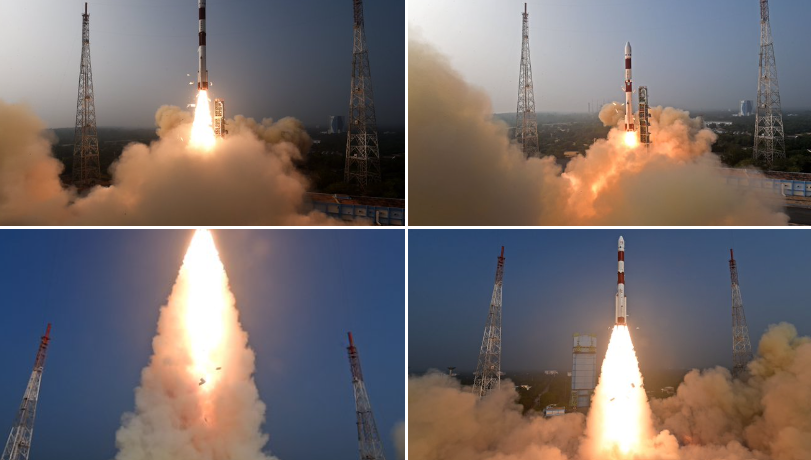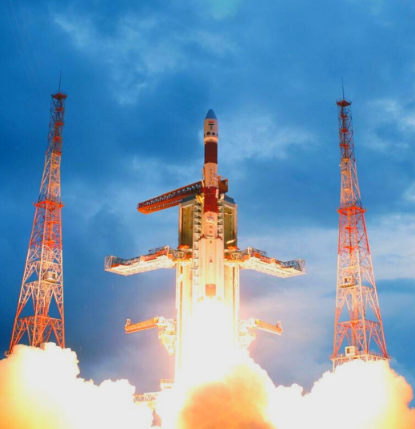
ISRO Embarks on ‘Gaganyaan Year’ with XPoSat: Unveiling India’s Vision into the Cosmic Depths1
ISRO heralds the beginning of the ‘Gaganyaan Year’ with the launch of XPoSat
In a significant stride toward the ambitious Gaganyaan mission, ISRO heralds the beginning of the ‘Gaganyaan Year’ with the launch of XPoSat, India’s pioneering eye in the vast expanse of deep space.
Kicking off the new year on a high note, the Indian Space Research Organisation (ISRO) achieved a successful launch with its inaugural X-ray Polarimeter Satellite (XPoSat). This groundbreaking mission aims to explore X-ray polarization and study cosmic phenomena such as black holes and neutron stars.
The launch took place from the Satish Dhawan Space Centre in Sriharikota on Monday morning, utilizing ISRO reliable launch vehicle PSLV-C58. After a 21-minute flight, the XPoSat was precisely positioned in a circular orbit at 650 km above Earth’s surface.

Distinguished as only the world’s second mission of its kind, following NASA’s Imaging X-ray Polarimetry Explorer (IXPE) launched in 2021, XPoSat features two payloads: the Indian X-ray Polarimeter (POLIX) and X-ray Spectroscopy and Timing (XSPECT). These cutting-edge payloads were developed by the Raman Research Institute and the UR Rao Satellite Centre, both located in Bengaluru.
ISRO Chairman S. Somanath expressed his satisfaction with the mission’s success, stating, “On 1st January 2024, yet another successful mission of the PSLV has been accomplished. PSLV C58 has placed the primary satellite XPoSat in the desired orbit, with a deviation from the targeted orbit of only 3 km and an inclination of 0.001 degree, showcasing excellent orbital conditions. The deployment of the satellite’s solar panel has also been executed successfully.”
Looking ahead, Somanath highlighted the upcoming launches in 2024, declaring it as the “year of Gaganyaan,” India’s momentous human spaceflight program. He mentioned the TV-D1 mission from the previous year and anticipated two more test flights of the Test Vehicle, followed by the unmanned mission as part of the Gaganyaan program.
ISRO’s triumph with the XPoSat launch sets the stage for a year filled with promising endeavors in space exploration. The XPoSat mission holds significant scientific value as it aims to delve into the complexities of X-ray polarization, unraveling the mysteries surrounding cosmic entities like black holes and neutron stars.

The successful deployment of XPoSat into its designated orbit reflects ISRO’s precision and expertise in space missions. The subtle deviation of only 3 km from the targeted orbit and an inclination of 0.001 degree highlight the exceptional orbital conditions achieved during this mission.
As the scientific community eagerly awaits the insights that XPoSat will unveil, ISRO’s Chairman, S. Somanath, emphasized the upcoming milestones in 2024. Declaring it as the “year of Gaganyaan,” he anticipates a series of launches, building on the success of previous missions. The mention of two more test flights of the Test Vehicle and the imminent unmanned mission of the Gaganyaan program adds to the anticipation surrounding India’s ambitious foray into human spaceflight.
ISRO’s continuous strides in space exploration and its commitment to pushing boundaries underscore India’s emergence as a key player in the global space arena. With a lineup of missions on the horizon, 2024 promises to be a year marked by scientific breakthroughs and advancements, cementing India’s position in the forefront of space exploration.
The commencement of 2024 marks a triumphant start for ISRO, with plans for a series of launches, including PSLV, GSLV, and the innovative SSLV missions. The success of the PSLV-C58/XPoSat mission is a testament to ISRO’s unwavering commitment to advancing space exploration, garnering praise from Union Minister of State for the Department of Space, Dr. Jitendra Singh.
Following the injection of XPoSat into its designated orbit, the fourth stage of the launch vehicle underwent two firings, strategically bringing it down to a 350-km orbit. This lowered orbit serves as a platform for experiments, aligning with ISRO’s commitment to responsible space practices by minimizing debris creation. The platform, equipped with experiments under the PSLV Orbital Experimental Module (POEM), will be operational for approximately a month before re-entering the atmosphere.
Notably, the POEM platform hosts diverse experiments, showcasing ISRO’s dedication to technological advancements. The Women Engineered Satellite (WESAT), designed by LBS Institute of Technology for Women, aims to study the correlation between solar irradiance and the UV index. Other experiments include a fuel cell power system by ISRO’s Vikram Sarabhai Space Centre, serving as a precursor to future power systems for space stations, an inter-planetary dust count experiment by Physical Research Laboratory, and a silicon-based high energy cell by VSSC, among others.
The deployment of XPoSat solidifies India’s position in space observation, making it the country’s third space-based observatory after the recently launched solar mission Aditya-L1 and AstroSat in 2015. The study of the polarization of astronomical X-rays through XPoSat holds the promise of unraveling intricate processes behind X-ray emissions, providing valuable insights into celestial phenomena.
As ISRO continues to push the boundaries of space exploration, the success of the XPoSat mission underscores India’s growing prowess in scientific endeavors and its strategic vision for the future of space research. The ongoing commitment to responsible space practices and cutting-edge experiments positions ISRO as a key player on the global stage of space exploration and technology.
For the latest updates-click here.

